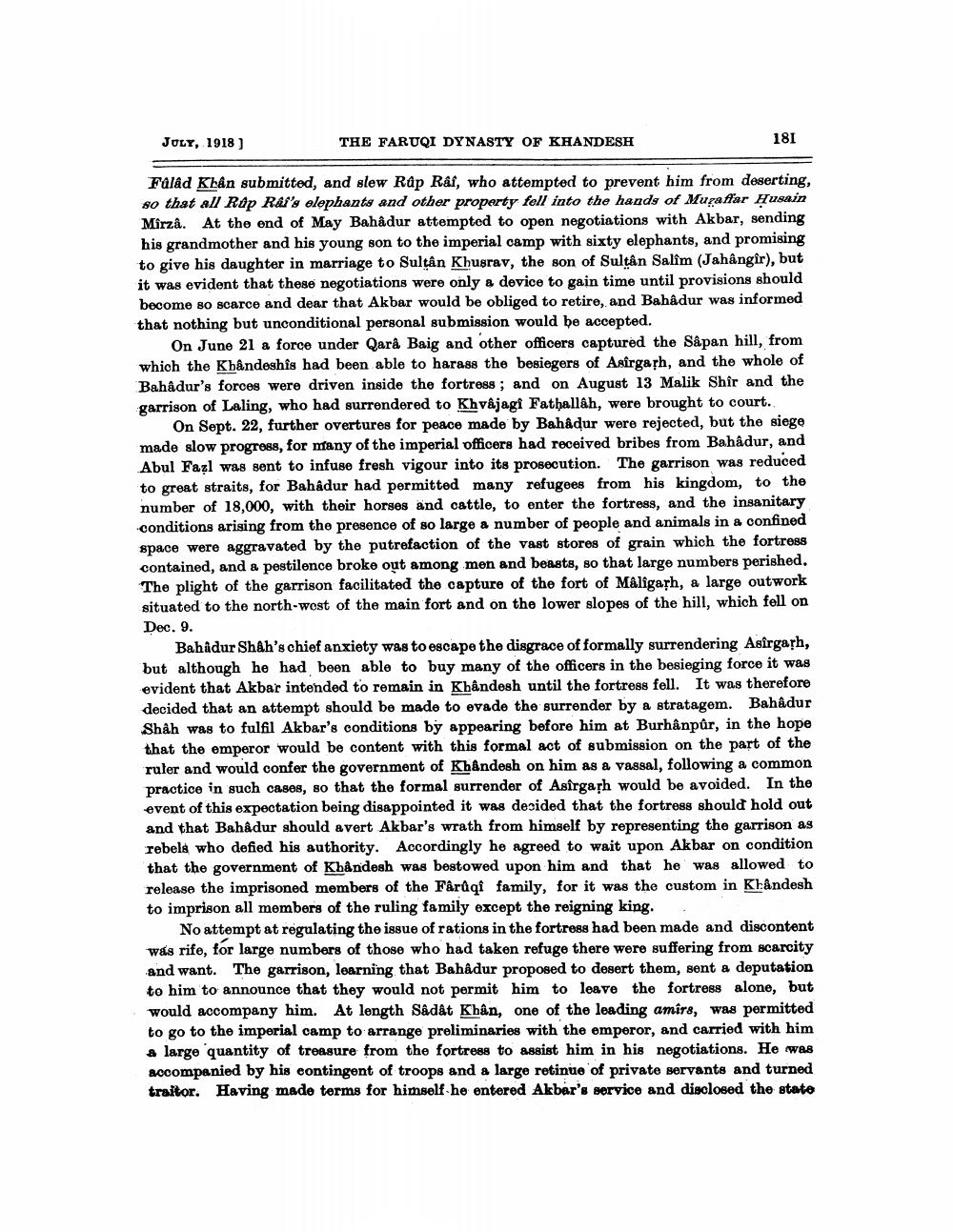________________
JOLY, 1918)
THE FARUQI DYNASTY OF KHANDESH
181
Falad Khân submitted, and slew Rap Rái, who attempted to prevent him from deserting, so that all Rap Ral's elephants and other property fell into the hands of Muzaffar Husain Mirza. At the end of May Bahadur attempted to open negotiations with Akbar, sending his grandmother and his young son to the imperial camp with sixty elephants, and promising to give his daughter in marriage to Sultan Khusrav, the son of Sultan Salim (Jahângir), but it was evident that these negotiations were only a device to gain time until provisions should become so scarce and dear that Akbar would be obliged to retire, and Bahadur was informed that nothing but unconditional personal submission would be accepted.
On June 21 a force under Qara Baig and other officers captured the Såpan hill, from which the Kbândoshis had been able to harass the besiegers of Asirgarh, and the whole of Bahadur's forces were driven inside the fortress; and on August 13 Malik Shîr and the garrison of Laling, who had surrendered to Khvâjagi Fathallâh, were brought to court.
On Sept. 22, further overtures for peace made by Bahadur were rejected, but the siege made slow progress, for many of the imperial officers had received bribes from Bahadur, and Abul Fazl was sent to infuse fresh vigour into its prosecution. The garrison was reduced to great straits, for Bahadur had permitted many refugees from his kingdom, to the number of 18,000, with their horses and cattle, to enter the fortress, and the insanitary conditions arising from the presence of so large a number of people and animals in a confined space were aggravated by the putrefaction of the vast stores of grain which the fortress contained, and a pestilence broke out among men and beasts, so that large numbers perished, The plight of the garrison facilitated the capture of the fort of Måligarh, a large outwork situated to the north-west of the main fort and on the lower slopes of the hill, which fell on Dec. 9.
Bahadur Shah's chief anxiety was to escape the disgrace of formally surrendering Asirgash, but although he had been able to buy many of the officers in the besieging force it was evident that Akbar intended to remain in Khandesh until the fortress fell. It was therefore decided that an attempt should be made to evade the surrender by a stratagem. Bahadur Shah was to fulfil Akbar's conditions by appearing before him at Burhanpur, in the hope that the emperor would be content with this formal act of submission on the part of the ruter and would confer the government of Khandesh on him as a vassal, following a common practice in such cases, so that the formal surrender of Asîrgash would be avoided. In the event of this expectation being disappointed it was decided that the fortress should hold out and that Bahadur should avert Akbar's wrath from himself by representing the garrison as rebels who defied his authority. Accordingly he agreed to wait upon Akbar on condition that the government of Kbândesh was bestowed upon him and that he was allowed to release the imprisoned members of the Faruqi family, for it was the custom in Khandesh to imprison all members of the ruling family except the reigning king.
No attempt at regulating the issue of rations in the fortress had been made and discontent was rife, for large numbers of those who had taken refuge there were suffering from scarcity and want. The garrison, learning that Bahadur proposed to desert them, sent a deputation to him to announce that they would not permit him to leave the fortress alone, but would accompany him. At length Sádát Khân, one of the leading amirs, was permitted to go to the imperial camp to arrange preliminaries with the emperor, and carried with him a large quantity of treasure from the fortress to assist him in his negotiations. He was accompanied by his contingent of troops and a large retinue of private servants and turned traitor. Having made terms for himself-he entered Akbar's service and disclosed the state




